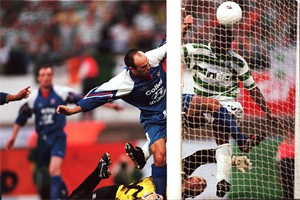
The Welsh Premier League was born out of political necessity in 1992.
Welsh football had lost a (British) championship and not yet found a role. This situation was being exploited in FIFA circles by African and Asian nations who resented the independent status of the four British associations, and who saw the participation of the senior Welsh clubs in English football as a contradiction of that status.
The problems set by local geography and the economy, together with the presence of its powerful English neighbour, had prevented Wales forming its own national championship until the FA of Wales took the initiative in 1992 and founded the League of Wales.
The 20 original members were drawn on a roughly equal basis from all parts of the country, and from the Welsh League and Cymru Alliance League in particular, Bangor and Newtown joining from the Northern Premier League.
The inaugural season's champions were Cwmbran Town, who thus became the first Welsh club to play in the European Champions' Cup. The runners-up were Inter Cardiff, who finished in the same position in the following season when Bangor City won the first of their back-to-back titles. Barry Town won the next four championship titles - they had returned from English football and owner Neil O'Halloran had made them the first league club to be full-time professionals.
Under the shrewd management of Gary Barnett they were virtually unbeatable in domestic football and their standard may be measured by their 1996 UEFA Cup success when they beat Dinaburg (Latvia)and Vasutas Budapest before falling 6-4 to Aberdeen, the second leg being played in front of 6,500 spectators at Jenner Park.
In season 1999/2000 their run of titles came to an end when Total Network Solutions (formerly Llansantffraid FC) won the title on the last weekend of the season. Barry's dominance was quickly reasserted and they were again crowned champions over the next three seasons. By the beginning of 2003/4 Total Network Solutions had also taken up the option of fielding a team of full-timers, but at that very point in time the Barry club suffered almost fatal financial collapse and limped through the season without leaving the bottom place.
TNS unexpectedly found the championship being contested by Rhyl and the denouement came at Belle Vue on Easter Sunday when the home side won by a solitary goal in front of a league record crowd of 2,700.
The League was sponsored in 2004/5 and 2005/6 by Vauxhall Masterfit, having been previously sponsored by Konica in its opening season and by JT Hughes (Mitsubishi) in the previous two seasons.
In addition, the League Cup (presently sponsored by Loosemores of Cardiff) has been competed for annually. Afan Lido won the first two competitions, and were followed by Llansantffraid and Connah's Quay. Barry completed their purple patch by winning four consecutive cup finals before Caersws (twice) and Rhyl made their own mark on the competition.
The league has shown signs of a maturing competition with the development of players who have entered the English professional leagues. The outstanding example is Mark Delaney, an established international player, who attracted attention with Carmarthen Town and made his way into the Welsh side via Cardiff and Aston Villa. More recently, Lee Trundle has progressed to Wrexham and Swansea from Rhyl.
Perhaps more notable, Gary Lloyd (Barry), Paul Roberts (Porthmadog) and Eifion Williams (Caernarfon and Barry) won 'B' caps while playing in the league. At the beginning of season 2004/5 two young players (James Coates of TNS and Les Davies of Bangor) were selected for Wales U-21 squad and they are proof positive of the key role which the Welsh Premier League plays in football in our Principality.
[Alun Evans]
